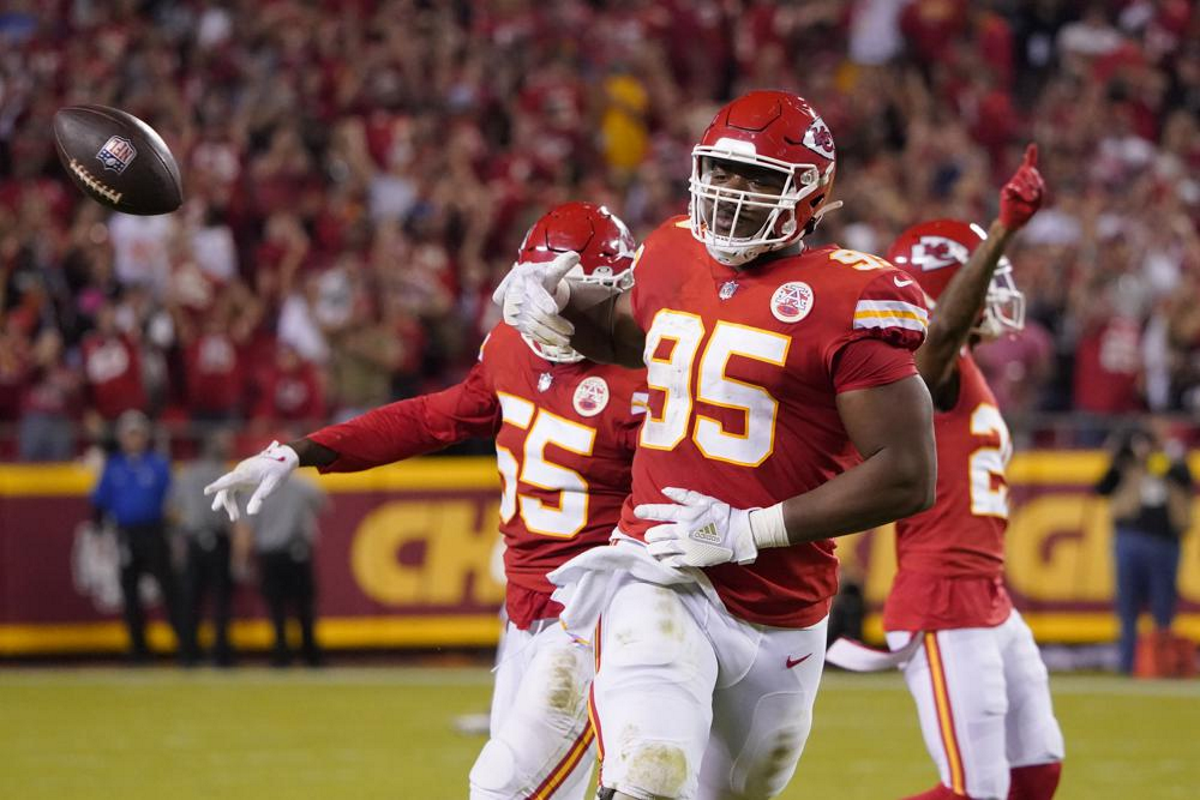KANSAS CITY, Mo. (AP) — The NFL and its beleaguered officiating crew didn’t even get one day to rest after its latest controversy before another one erupted just before halftime of the Las Vegas Raiders’ game against the Kansas City Chiefs on Monday night.
The Chiefs had just scored to trim their deficit to 17-7 when Chris Jones stripped Derek Carr from behind. The Pro Bowl defensive tackle landed on the Raiders quarterback while also coming away with the ball — replays showed it was clearly loose and that Jones clearly recovered — and referee Carl Cheffers threw a flag for roughing the passer.
The play happened with less than two minutes to go and was not reviewed.
Chiefs coach Andy Reid stormed off the sideline to argue with every official within earshot. And after the teams traded field goals, leaving the Raiders ahead 20-10 at halftime, Reid cornered Cheffers again as they headed to the locker room.
When the players emerged for the second half, Kansas City fans booed Cheffers more loudly than the hated Raiders.
The call came one day after Atlanta defensive tackle Grady Jarrett was flagged by referee Jerome Boger for a seemingly innocuous tackle of Tampa Bay quarterback Tom Brady. The penalty gave the Buccaneers a first down and allowed them to run out the clock on a 21-15 victory, rather than giving the Falcons a chance to drive for the win.
“What I had was the defender grabbed the quarterback while he was still in the pocket, and unnecessarily throwing him to the ground,” Boger told a pool reporter after the game. “That is what I was making my decision based upon.”
The NFL has been criticized for its failure to protect quarterbacks after Dolphins quarterback Tua Tagovailoa was taken off the field on a stretcher following a violent hit in a game against Cincinnati. Tagovailoa sustained a concussion when his head was slammed to the turf by the Bengals’ Josh Tupou, who was not flagged on the play.
In the NFL rulebook, it states: “Any physical acts against a player who is in a passing posture (i.e. before, during, or after a pass) which, in the referee’s judgment, are unwarranted by the circumstances of the play will be called as fouls.”
The rulebook also notes: “When in doubt about a roughness call or potentially dangerous tactic against the quarterback, the referee should always call roughing the passer.”
“Obviously from my vantage point, it looked like it was a bad call,” Falcons cornerback Casey Hayward Jr. said Sunday. “But that’s why you put the refs out there to make these calls. They pay these guys to make those calls. It looked bad (from) my standpoint, but like I said, I was on the back end. They put these guys there to make those calls.”
Meanwhile, the Chiefs have had plenty of conflicts with Cheffers in the past.
The biggest came during the 2016 playoffs against Pittsburgh, when Cheffers called left tackle Eric Fisher for holding that negated what would have been a tying two-point conversion. The Steelers won 18-16 to advance to the AFC title game, and Chiefs tight end Travis Kelce said Cheffers “shouldn’t even be able to work at … Foot Locker.”

